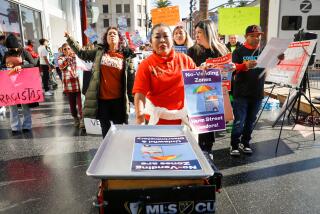Out-of-Town Ticket May Be Fought Without Traveling to Court
- Share via
Q. I got a speeding ticket in Fresno on my way back to Orange County from Yosemite National Park. I don’t think the ticket is fair, but I don’t have the time to go to Fresno to fight it. It doesn’t seem right that I should have to pay the fine--which is over $100--just because I can’t go back there. Shouldn’t the law do something about cases such as this?
P.J.,
Tustin
A. The law does allow a person who has received citations for certain types of moving violations and parking violations to file a written declaration--rather than appearing at trial--explaining his or her position to the court for which the citation was issued. In order to take advantage of this provision, the person must live more than 100 miles from the court.
This provision does not, however, generally apply to driving violations involving alcohol or drugs.
You should contact the court in Fresno as to whether you qualify for this procedure and ask about the steps you should take to comply with it.
Q. I have a promissory note that the borrower attempted to pay off with a check that bounced. I haven’t done anything about it because of the rush of the holiday season. A friend told me that there is a certain period during which I must sue before my claim becomes invalid. Is there such a rule?
C.M.,
Seal Beach
A. The rule to which your friend refers is called the Statute of Limitations. One of its purposes is to prevent lawsuits from becoming stale.
Your promissory note is a type of contract. With such a written agreement, the general rule is that an action must be brought within four years from the due date. If it is an oral agreement, the general rule is two years from the due date.
These general rules may be subject to exceptions depending upon the facts of the particular case. You should obtain legal advice, particularly if you have any concerns regarding the timeliness of your claim.
Q. I am a defendant in a lawsuit that I believe I will win. If I do win, can I get the plaintiff to pay my attorney fees?
S.E.,
Newport Beach
A. The general rule is that each party handles the cost of his or her own attorney. A party may recover attorney fees from the other side if there is a contract or legislation that provides for it.
A prevailing party is, however, entitled to recover such costs as the filing fee and services of process fee. Your attorney should certainly be able to tell you which fees you will be expected to pay should you win or lose.
B. Tam Nomoto, an Orange County Municipal Court judge, answers readers’ questions about the law. Ask the Judge runs every other Saturday in Orange County Life.
More to Read
Sign up for Essential California
The most important California stories and recommendations in your inbox every morning.
You may occasionally receive promotional content from the Los Angeles Times.













